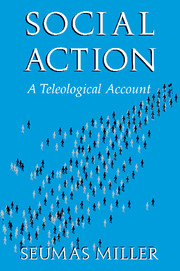5 - Organisations, Agency, and Action
Published online by Cambridge University Press: 04 December 2009
Summary
ORGANISATIONS
Thus far in this book on social action we have considered in detail only single joint actions and regularities in action, especially conventional action and norm-governed action; we have not looked at structures of human action. In this chapter and the following one we will consider structures of human action, and especially organisational action and institutional action. In Chapter 1 distinctions were made between organisations, social groups and institutions. I now want to invoke these distinctions and elaborate on them. In this chapter I consider organisations. In the following chapter I offer detailed treatments of institutions and social groups.
My central concern in this chapter is to argue that the “actions” of organisations are reducible to the actions of individual human persons. I do not accept that macro-entities, such as nation states and corporations, have beliefs and intentions, and consequently are either rational or moral agents. Properly speaking, all social actions are performed by individuals, not social entities.
It should be noted that in advocating this form of individualism I am not committed to any of the following claims:
(1) Social groups and/or organisations are reducible to the individuals who (at least in part) constitute them.
(2) Social groups and/or organisations do not have causal powers.
(3) Social groups and/or organisations cannot be blamed in some non-moral sense of blame for causing undesirable states of affairs, such as pollution of the environment.
(4) It is never appropriate for individuals, courts of law, and so on, to treat organisations (in particular) as if they were rational or moral agents.
- Type
- Chapter
- Information
- Social ActionA Teleological Account, pp. 160 - 180Publisher: Cambridge University PressPrint publication year: 2001



